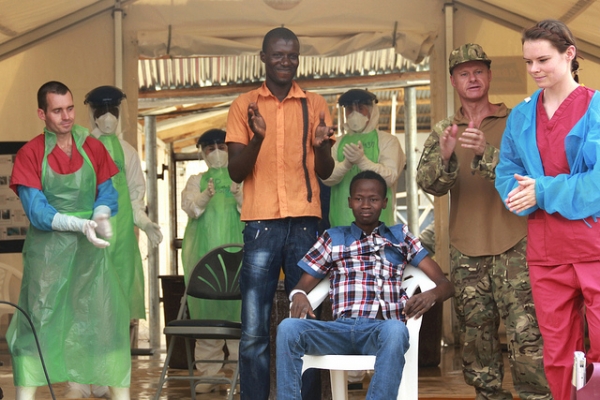
Sewa Mansaray, at a treatment center in Sierra Leone, is one of the hundreds of Ebola survivors.
An experimental vaccine against the Ebola virus tested in Guinea proves effective in initial stages of analysis, according to reports published in medical journal The Lancet on Friday.
The study for the vaccine was named Ebola ça Suffit (French for “Ebola, this is enough") and was launched in March 2015 to test whether it could help contain and eliminate Ebola from West African countries like Liberia, Guinea, and Sierra Leone. The experimental vaccine, called VSV-EBOV, was developed by the Public Health Agency of Canada and licensed by NewLink Genetics Corp., a small biotech company, and Merck & Co., a vaccine maker, both companies which are based in the U.S. The World Health Organization (WHO) and the Canadian government were among the several funders of the study.
“The hope was a vaccine might be developed in sufficient time to have an impact to help control and maybe help eliminate this Ebola outbreak if it were to persist,” said Mark Feinberg, chief public-health and scientific officer for Merck, according to the Wall Street Journal. “The study did provide strong evidence supporting vaccine efficacy. Whether this evidence by itself will be seen by all stakeholders as definitive will be an important discussion.”
The participants had been in close contact with recently diagnosed Ebola patients. The concept of vaccinating the people who had been in close contact with an infected person is called the “ring” strategy and is meant to create a wall around infected persons by vaccinating the people around them to protect the larger community of those who are not vaccinated. The participants were randomized into two groups-- one group received the vaccine immediately while the other group received the vaccine after 21 days. Among the immediately vaccinated, none of the 4,123 people developed the virus within 10 days. Among 2,528 vaccinated 21 days after exposure, 16 developed the virus. The published results suggest that the vaccine may be effective.
“For the first time ever, we received evidence of efficacy of a vaccine that will help [with] fighting Ebola,” Bertrand Draguez, medical director at Medecins Sans Frontieres, said in a statement. He adds that the results are not definitive and more data is needed to determine when the vaccine kicks in and how long the effects last.
While European researchers argue that people should not be randomly assigned to placebo, U.S. researchers with FDA and National Institutes of Health maintain that only random assignments can produce reliable data. Dr John-Arne Rottingen of the Norwegian Institute of Public Health says that researchers feared “that the outbreak would really continue into an epidemic” in Guinea, being the reason why researchers did not use a placebo, according to the Wall Street Journal report.
The number of new cases has significantly decreased this year, which has led some to consider that with new cases dwindling, the analysis of the effectiveness of vaccines and therapies can be affected.
Since the initial outbreak of the virus in March 2014, Ebola has infected 27,780 people and has killed 11,290, according to the WHO. On Sunday, July 26, WHO announced 4 cases in Guinea and 3 in Sierra Leone.
"This is the lowest weekly total for over a year, and comes after 8 consecutive weeks during which case incidence had plateaued at between 20 and 30 cases per week," said the WHO.












